Introduction
Diesel generators are essential power sources in various applications, providing reliable electricity during times of grid outages or in remote locations. One critical factor that can impact the performance of diesel generators is operating in low-temperature environments. In cold climates, diesel generators face challenges such as fuel gelling, reduced battery performance, and engine start-up issues. 75kw diesel generator for remote communication towers into the importance of diesel generators for low-temperature operation, the challenges they face, and strategies to optimize their efficiency in such conditions.
Understanding Diesel Generators for Low-Temperature Operation

Diesel generators are widely used for their durability, efficiency, and reliability. They consist of an internal combustion engine that runs on diesel fuel, coupled with an electric generator to produce electricity. In low-temperature environments, diesel generators face unique challenges that can affect their performance and efficiency.
One of the primary issues with diesel generators in cold climates is fuel gelling. Diesel fuel contains paraffin wax, which can solidify and form a gel-like substance at low temperatures. This can clog fuel filters, fuel lines, and injectors, leading to engine stalling and failure to start. Additionally, cold temperatures can cause the viscosity of diesel fuel to increase, making it harder to pump and combust efficiently.
Another challenge for diesel generators in low-temperature operation is reduced battery performance. Cold temperatures can decrease the capacity and efficiency of batteries, making it harder to start the engine and maintain proper electrical functions. In extreme cold conditions, batteries may freeze, rendering them useless and requiring replacement.
Engine start-up issues are also common in cold climates, as diesel engines require proper preheating to reach the optimum temperature for combustion. Cold starting can put a strain on the engine components and reduce its lifespan if not done correctly. Additionally, low temperatures can affect the lubrication of engine parts, leading to increased wear and potential damage.
Optimizing Diesel Generators for Low-Temperature Operation
To ensure the reliable operation of diesel generators in low-temperature environments, several strategies can be implemented to overcome the challenges mentioned above and optimize efficiency. These include the following:
1. Fuel Heating Systems: Installing fuel heating systems can prevent fuel gelling by maintaining the diesel fuel at a suitable temperature. These systems can heat the fuel before it reaches the engine, ensuring smooth flow and combustion even in cold conditions.
2. Fuel Additives: Using fuel additives designed for cold weather can improve the cold flow properties of diesel fuel, preventing gelling and reducing viscosity. Anti-gel additives can lower the pour point of diesel fuel and improve its performance in low temperatures.
3. Battery Heaters: Installing battery heaters can keep the batteries warm and maintain their capacity in cold weather. This ensures reliable engine start-up and electrical functions even in extreme cold conditions.
4. Engine Block Heaters: Engine block heaters can preheat the diesel engine before starting, reducing wear on engine components and ensuring a smooth start-up process. These heaters can be essential in very cold climates where cold starting can be challenging.
5. Insulation and Shelter: Providing proper insulation and shelter for diesel generators can help maintain ambient temperature levels and protect them from extreme cold conditions. Enclosures or thermal blankets can prevent heat loss and ensure optimal performance.
6. Regular Maintenance: Regular maintenance checks and servicing are crucial for diesel generators operating in low-temperature environments. This includes monitoring fuel quality, checking battery health, inspecting engine components, and ensuring all heating systems are functioning correctly.
Conclusion
Diesel generators play a vital role in providing reliable power in various applications, including during emergencies or in remote locations. Operating diesel generators in low-temperature environments presents unique challenges that can impact their performance and efficiency. By implementing strategies such as fuel heating systems, fuel additives, battery heaters, engine block heaters, insulation, and regular maintenance, diesel generators can be optimized for low-temperature operation, ensuring reliable electricity supply even in cold climates. It is essential for users and operators to understand these challenges and take proactive measures to maximize the efficiency and longevity of diesel generators in low-temperature conditions.
